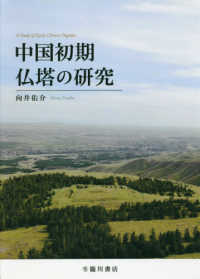- ホーム
- > 洋書
- > 英文書
- > Politics / International Relations
Full Description
Value without Fetish presents the first in-depth English-language study of the influential Japanese economist Uno Kōzō's (1897-1977) theory of 'pure capitalism' in the light of the method and object of Marx's Critique of Political Economy. A close analysis of the theories of value, production and reproduction, and crisis in Uno's central texts from the 1930s to the 1970s reveals his departure from Marx's central insights about the fetish character of the capitalist mode of production - a departure that Lange shows can be traced back to the failed epistemology of value developed in Uno's earliest writings. By disavowing the complex relation between value and fetish that structures Marx's critique, Uno adopts the paradigms of neoclassical theories to present an apology rather than a critique of capitalism.
Contents
Acknowledgements
Note on Translations and Transcriptions
Part 1 The Method of The Critique of Political Economy
1 Introduction - Marx's Critique of Fetishism as Method
1.1 The Critique of Fetishism and Uno's Theory of 'Pure Capitalism'
1.2 The Aporias of Classical Political Economy
1.3 The Critical Function of Marx's Labour Theory of Value. Against Some Readings of 'Form' in Contemporary Value Form Theory
2 What's 'Pure' about Capitalism? Uno's Three-Level Method and the Theory of Principles
2.1 The Limits of the Three-Level Method (sandankairon)
2.2 Pure Theory's X-Axis: The Law of Population
2.3 Pure Theory's Y-Axis: The Commodification of Labour Power
Part 2 The Object of The Critique of Political Economy
3 Uno's Theory of Value - Value without Fetish (1947-69)
3.1 The Problem of Abstract Labour in Uno's Theory of Value
3.2 Uno's Theory of Value: Methodological Individualism and the Fetishism of Use Value
3.3 Uno's Theory of Money: Baileyan Assumptions
3.4 Uno's Theory of Capital: M-C-M' as Pure Form
4 The Principles of Political Economy (1952/1964) in Light of Marx's Critique of Political Economy
4.1 The Reconstruction of Capital
4.2 The Law of Value as the Law of General Social Equilibrium (Uno)
4.3 Surplus Value and Profit: The 'Transformation Problem' in Uno's Perspective
4.4 The Law of Value as the Law of Crisis (Marx)
5 Uno's Legacy in Japan and Beyond
5.1 Money vs. Value? The 'Monetary Approach' in the Post-Uno School of Value Theory
5.2 The 'Dialectic of Capital' as the Apologetic of Capital in the Anglophone Uno School
5.3 The Meaning of Real Subsumption or the Real Subsumption of Meaning: Aspects of Anglophone Uno School Historiographies
References
Index







